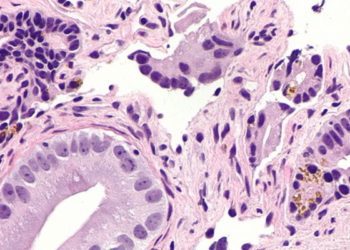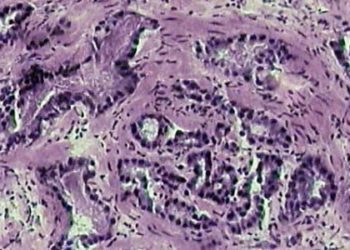Pelvic lymph node radiotherapy and androgen deprivation therapy augment progression-free status following prostatectomy
1. 5-year progression-free status was greatest in group 3 (triple therapy) and lowest in group 1 (pelvic bed radiotherapy alone).
2. Grade 2 or greater toxicities were more common in treatment group 3 within the first 3-months of treatment.
Evidence Rating Level: 1 (Excellent)
Study Rundown: Prostate-specific antigen (PSA) is a marker used to assess for progression of prostate cancer following prostatectomy. Existing research suggests that prostate bed radiotherapy (PBRT) can significantly reduce failure rates. However, the effect of other modalities, including androgen deprivation therapy (ADT) and pelvic lymph node radiotherapy (PLNRT) on prostate cancer is not well known. This randomized controlled trial aimed to compare the safety and efficacy of PBRT alone (group one), PBRT plus short-term ADT (group two), or PBRT plus short-term ADT and PLNRT (group three). The primary outcome was progression-free status at five years, while key secondary outcomes included grade two or three adverse events and castration-resistant disease. According to study results, the proportion of patients achieving progression-free status was significantly greater in group three compared to group one. However, patients in group 3 experienced more acute toxicities within the first three months. This study was strengthened by a large sample size with patients from multiple treatment centers around the world, adding to its generalizability.
Click to read the study in The Lancet
Relevant Reading: Lutetium-177–PSMA-617 for Metastatic Castration-Resistant Prostate Cancer
In-depth [randomized-controlled trial]: Between Mar 31, 2008, and Mar 30, 2015, 1792 men were assessed for eligibility across 283 radiation oncology treatment centres in the USA, Canada, and Israel. Included were those ≥ 18 years of age with a PSA level of 0.1-2.0 ng/mL, uninvolved lymph nodes and a Gleason score ≤ 9. Altogether, 1716 patients (564 in PBRT alone [group 1], 578 in PBRT plus short-term ADT [group 2], and 574 in PLNRT plus PBRT plus short-term ADT [group 3]) were included in the intention-to-treat analysis. The primary outcome of 5-year freedom from progression was greater in group 3 (87.4%, 95% confidence interval [CI] 84.7-90.2) compared to group 2 (81.3%, 95% CI 78.0-84.6; p=0.0027) and group 1 (70.9%, 95% CI 67.0-74.9; p<0.0001). There were significantly more grade 2 or worse acute adverse events in group 3 (44%) than in group 2 (36%, p=0.0034) or group 1 (18%, p<0.0001). Overall, findings from this study suggest that addition of PBRT with short-term ADT may significantly reduce progression, and improve clinical outcomes, in patients with prostatectomy.
Image: PD
©2022 2 Minute Medicine, Inc. All rights reserved. No works may be reproduced without expressed written consent from 2 Minute Medicine, Inc. Inquire about licensing here. No article should be construed as medical advice and is not intended as such by the authors or by 2 Minute Medicine, Inc.







